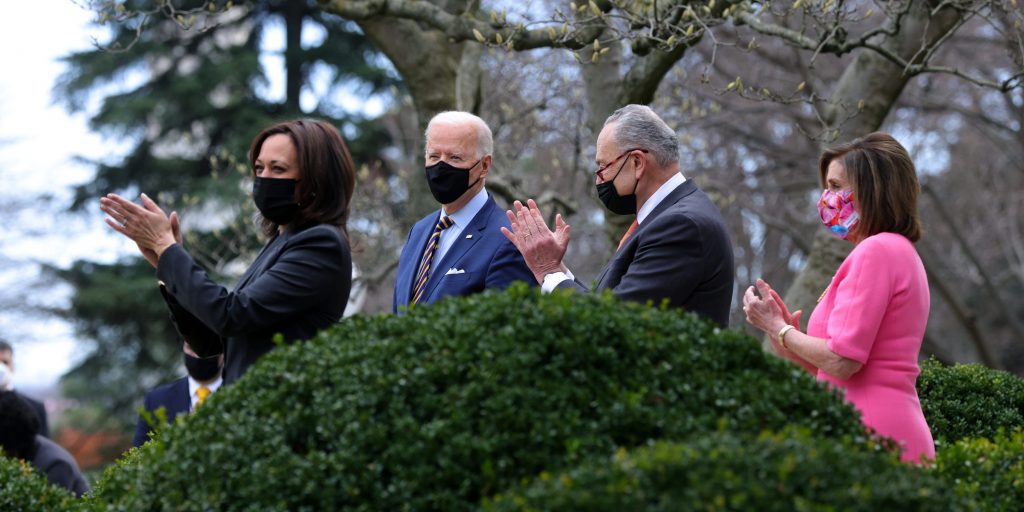
Alex Wong/Getty Images
- Democrats face several battles this week that will shape the Biden presidency and the US economy.
- The party aims to approve a $1 trillion infrastructure plan, an even larger families plan, and measures to tax the wealthy.
- Congress also faces deadlines to avoid a government shutdown and a debt-default recession.
Forget infrastructure week. It's economy week in America.
As September comes to a close, Democrats have an extraordinary policy agenda to get through. It includes roughly $4.5 trillion in fresh spending, new measures to tax the wealthy, and a last-minute effort to dodge a recession. Democrats aim to approve the measures before the week is out, setting Congress up for one of the busiest legislative weeks in recent memory.
Opposition is fierce. Democrats hold fragile majorities in both the House and Senate, and Republican leadership has vowed not to support most of their spending plans, assuring that Democrats will use budget reconciliation to pass most of President Joe Biden's agenda.
The week's legislative agenda includes much of the policy championed by Biden during his campaign and first nine months in office. With Democrats controlling Congress and the White House, failure to enact any of the proposals could be ruinous for the party, setting it up for failure in the 2022 midterm elections.
Included in legislative fights this week is funding the government, which has a concrete deadline requiring immediate action. Others, like Democrats' spending packages, have deadlines set by party leadership. While those cutoffs are looser, delaying votes any longer could endanger weeks of delicate negotiations within the party.
Here are the battles Democrats face as Congress enters a critical legislative week.
(1) A massive upgrade to America's roads and bridges
Of Biden's spending proposals, his infrastructure plan is the most likely to reach the Resolute desk for his signature. In June, a bipartisan group of lawmakers agreed on a $1 trillion infrastructure package that includes improvements to roads and bridges, clean water projects, broadband access, and electric-vehicle infrastructure.
But progressive Democrats are adamant they won't back the plan unless it's bundled with Biden's larger social spending plan. If the Democratic left wing can't convince moderates to spend big on revolutionary measures like expanded childcare, universal pre-K and paid family leave, those roads and bridges will continue to decay without fresh investment.
(2) A historic investment in climate change and family care
The bulk of the White House's proposals are in a $3.5 trillion social spending package, set to be passed via reconciliation. The plan includes funding for childcare, paid family leave, universal pre-K, expansions to Medicare, and investments in affordable housing projects.
Using the reconciliation process means that every single Democratic party member must vote yes. That threatens to shrink the entire plan, as moderate Democratic Sens. Joe Manchin and Kyrsten Sinema have balked at the current price tag. Leadership has already hinted at a smaller proposal, with Pelosi saying Sunday that the final package will cost less than the initial $3.5 trillion figure.
Failing to pass the package would doom the US economy to substandard growth for several years, Oxford Economics said in a September note, while approving it would help the economy grow faster than its pre-pandemic trend. Fumbling the plan would also scar Democrats in the midterms, as they'd have little to show for themselves when campaigning ramps up next year.
(3) Raising taxes on the wealthy and corporations
Democrats are also split over how they should pay for the ambitious social-safety-net programs.
House Democrats revealed the first details of their pay-fors on September 13, confirming sweeping plans to tax the country's richest people and corporations. Proposals include higher income tax rates for top earners, a higher corporate tax rate, and a 3% surtax on people making $5 million or more.
To be sure, the House framework is less ambitious than the White House's. It leaves intact the step-up basis loophole that allows wealthy Americans to pass on assets without any tax liabilities. It also fails to close the gap between the top income tax rate and capital gains tax rate, meaning rich Americans can pay less in taxes by living off their investment gains.
Pelosi and Schumer said Thursday they have a framework for covering the costs of the reconciliation bill, but didn't disclose details.
(4) A last-minute sprint to avoid government shutdown
The government is set to run out of money by September 30, giving lawmakers just days to approve new funding.
The Senate is scheduled to vote Monday on a short-term bill already approved in the House that would fund the government through December 3. Senate Minority Leader Mitch McConnell has said his caucus won't allow it to pass, balking at a rule that raises the debt limit and arguing Democrats can do it on their own.
At the same time, McConnell has warned the Democrats against playing "Russian roulette" with the economy, as he effectively does the same thing.
(5) Democrats' effort to avoid a self-inflicted recession
A government shutdown would be very bad, as Insider's Juliana Kaplan and Ayelet Sheffey reported, and a default on the national debt would be even worse. Janet Yellen said this month it would be a "catastrophe."
The US defaulting would lead funding for key support programs to freeze. The country would slide into a self-imposed recession. Millions would lose their jobs and trillions of dollars would be wiped out as stocks tumble.
The stakes are high. This week is go-time for Democrats. The game of Russian Roulette has already begun.

